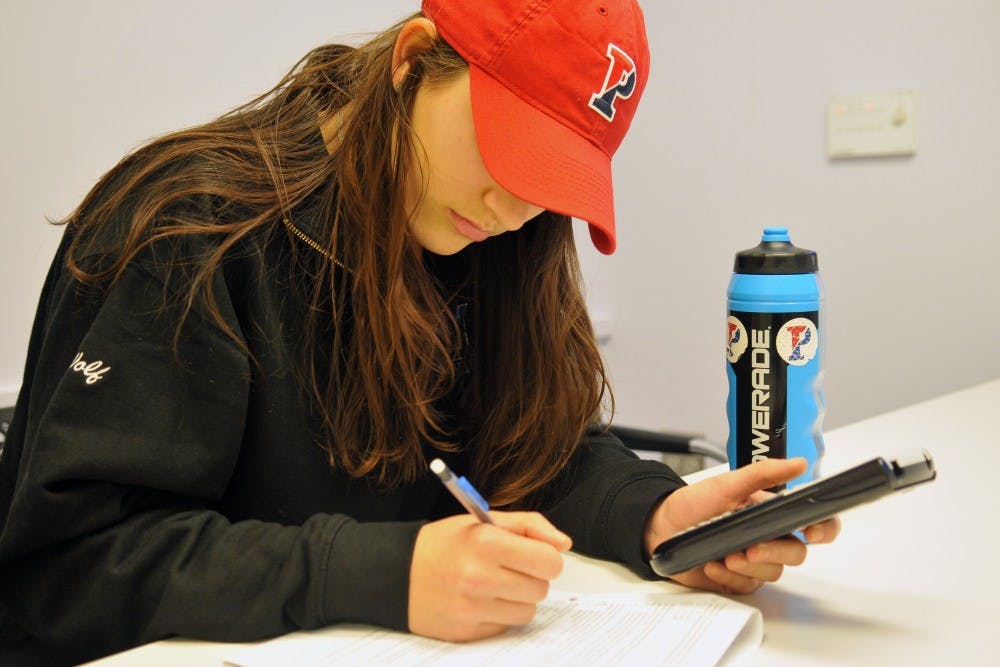
Students that observe less prominent holidays are not always accommodated by the Provost's Office.
Credit: Arabella UhryFor most students, midterm season is stressful enough as is.
Religious Jewish and Muslim students, however, face an additional stress factor on an annual basis with the possibility of midterms being scheduled on the same day as a religious holiday.
A number of observant Jewish students faced a dilemma this semester when midterm schedules overlapped with the holidays of Sukkot, Shemini Atzeret and Simchat Torah, which took place late September and early October. According to Hillel Director Rabbi Mike Uram, more exams were scheduled on the holidays this year than had been in previous years. Uram said he heard of a few professors who were unwilling to fairly accommodate students who wished to move their midterms to observe the holidays.
The Office of the Provost has strict guidelines that prohibit Penn’s academic departments from giving exams or assigning work on “several religious holidays that affect large numbers of University community members,” including Christmas, Rosh Hashanah, Yom Kippur, the first two days of Passover and Good Friday, according to the Provost’s website.
However, the rules blur for a number of “other holidays” that are “of importance to some individuals and groups,” as outlined on the site, such as Sukkot, the last two days of Passover, Shavuot, Shemini Atzerat, Simchat Torah, Chinese New Year, the Muslim New Year, Diwali and the Islamic holidays Eid al-Fitr and Eid al-Adha. Students who plan on observing these holidays must let their instructors know within the first two weeks of each semester so that alternative arrangements can be made regarding missed assignments and exams. Once the students inform their instructors, faculty then “must provide reasonable opportunities” to make up the missed work, according to the policy.
But this year, some students felt that they were not given “reasonable opportunities” to make up their work. Hillel President and College senior Michael Mitzner recounted stories of his friends who had issues with the policy this year. “A close friend of mine was in a class where there are three midterms, and the class allowed for one drop midterm. When my friend told the professor he had to miss one midterm because of holidays, the professor told him that the missed midterm would just have to be the drop, adding pressure to do extremely well on the other two,” Mitzner said.
Another friend of Mitzner’s was not offered an opportunity to take a midterm on another day when it conflicted with a holiday. Instead, the professor redistributed the percentage of the missed midterm (30 percent of the entire grade), putting 15 percent of the weight on midterm one and the other 15 percent on midterm three.
“The Provost policy differentiates ‘smaller’ holidays like Sukkot and Shemini Atzerat, but the problem with this from a Jewish perspective is that there is no difference in how they are observed from Rosh Hashanah or Passover,” Mitzner said. “Observers are not able to write or use their computers. And it’s not necessarily fair that there is some sort of hierarchy for the holidays. And while students are flexible and have worked through it, these situations can cause a lot of stress.”
Uram has noticed problems tend to arise mostly in large classes where it is harder to find space for exams, where grades are on a curve and the creation of the exam is labor-intensive for the professor.
Muslim students also face a tricky situation during midterm season each year when they celebrate Eid al-Adha, a holiday that has no set date and changes yearly according to the lunar calendar. This year, the holiday fell on Sept. 24.
Muslim Student Association Chaplain Kameelah Rashad said that during Eid al-Adha, students must decide between devoting time to family and worship or doing homework and taking exams. “Some students are reluctant to take advantages of exceptions because they don’t want professors to think they can’t keep up or even because of the perception of being too religious,” Rashad said. “So while students want to devote the time to acts of worship, just the fact that the holiday falls on a different day every year and that they have to ask for the religious exception, when it should be just available to them, makes it difficult.”
To help alleviate potential issues, the Office of the Chaplain sends out an email to staff at the beginning of every year with a list of religious holidays so staff can be mindful of students who celebrate.
“My sense is that the Provost’s Office and the Chaplain’s Office are looking to improve the situation and better train various faculty so they can be more sensitive to students of religious backgrounds,” Uram said.
Like Rashad, Uram also commented on how the students feel when they must ask for religious exceptions. “What I hear from students is that they feel scared to ask their professor to accommodate them because they’re worried it’ll affect their grade, and others are just uncomfortable asking,” Uram said. “While this may only happen to a professor once in a while, for the orthodox students, this is something that happens every fall, and it can create a set of experiences that make them feel other and different in a university that wants to make people from different backgrounds feel welcome. If a student is made to feel different because of who they are, we’re failing to meet the needs of students.”
The Daily Pennsylvanian is an independent, student-run newspaper. Please consider making a donation to support the coverage that shapes the University. Your generosity ensures a future of strong journalism at Penn.
DonatePlease note All comments are eligible for publication in The Daily Pennsylvanian.








